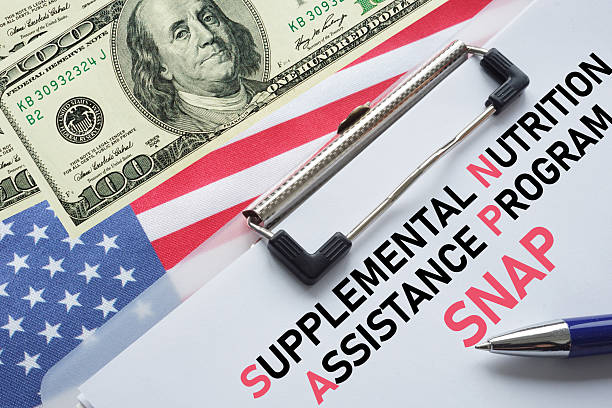
Millions of Americans could wake up on November 1 without access to food stamps, officially known as SNAP (Supplemental Nutrition Assistance Program) benefits, as the federal government shutdown drags on with no end in sight.
Across the country, state officials are warning that they cannot issue November SNAP benefits because federal funding has run out. The U.S. Department of Agriculture (USDA), which oversees the program, has said that emergency funds cannot legally be used to cover monthly benefits. Without a new budget agreement from Congress, there will be no money available to send out payments for November.
This means families who rely on SNAP to buy groceries could face serious food insecurity in the coming weeks, a devastating reality for millions, especially in Black communities where food deserts and economic disparities already make access to healthy meals difficult.
The issue stems from the ongoing government shutdown that began on October 1, 2025. Congress has failed to pass a funding bill for the new fiscal year, which has halted funding for many federal programs. Because SNAP is funded through the federal budget, states cannot issue benefits without that approval.
In other words, this isn’t about individuals missing paperwork or state-level mistakes; it’s a direct result of Washington gridlock. Some states, including Georgia, have already confirmed that SNAP benefits will not be available starting November 1 if the shutdown continues.
For families living paycheck to paycheck, that’s not just an inconvenience; it’s a crisis.
But while we can’t control what happens in Congress, there are steps you can take right now to protect your household and stretch what you already have.

How to Find Food During These Uncertain Times
If you or someone you know relies on SNAP, now is the time to plan ahead. Here are practical, immediate steps to help you find food support and make your groceries last longer.
1. Check your EBT balance and plan around what’s left.
Log in to your state’s SNAP or EBT portal to see what’s available. Make a list of what’s already in your fridge, freezer, and pantry so you can build meals using what you have before buying anything new.
2. Connect with local food banks and pantries now.
Don’t wait until your benefits run out. Many food banks and churches are preparing for increased need if the shutdown continues. Visit FeedingAmerica.org or call 211 to find food pantries in your ZIP code. If you’re in a major city, check with your local YMCA, Urban League, or faith-based organizations; many already have food distribution partnerships.
3. Ask about community meals and mobile food programs.
Some nonprofits and churches offer hot meal programs, especially for seniors, families, and college students. If you’re near an HBCU, many campuses also have student food pantries or partnerships with community organizations.
4. Reach out to family or neighbors for mutual support.
This is the time to lean on community. Share groceries, split bulk purchases, or cook together to stretch resources. Many families find that meal-sharing not only saves money but also strengthens relationships and morale during hard times.

How to Stretch What You Already Have
When times are tough, small habits can make a big difference. Here’s how to make your groceries last longer and get the most out of every meal.
Buy smart, not fast.
Stick to affordable, filling basics like beans, rice, lentils, eggs, frozen vegetables, and canned tuna or salmon. These staples can create multiple meals without breaking the bank.
Cook once, eat twice.
Make larger portions of meals like chili, soup, or pasta and freeze leftovers for later. It saves money and prevents food waste.
Use what you have before it spoils.
Store perishable foods properly, and move older items to the front of your fridge or pantry so you remember to use them first.
Get creative with leftovers.
Leftover chicken can become chicken salad. Rice can turn into fried rice or a soup filler. Overripe fruit can go into smoothies or oatmeal. Nothing should go to waste right now.
Keep your meals simple and balanced.
You don’t need expensive ingredients to eat well. Focus on combining proteins, grains, and vegetables in every meal. For example:
-
Brown rice + black beans + frozen mixed vegetables
-
Oatmeal + peanut butter + sliced banana
-
Whole wheat pasta + canned tomatoes + tuna + spinach
Make a plan and stick to it.
Write out a weekly meal plan and grocery list. This prevents impulse spending and ensures that every purchase has a purpose.
Holding On Through Uncertain Times
It’s easy to feel powerless when national issues impact everyday life, but community strength and preparation can make a difference. The potential pause in food stamps is not your fault. It’s the result of political gridlock that affects millions of hardworking families.
Right now, the best thing we can do is stay informed, plan ahead, and look out for one another. Check local news updates and community bulletins for any changes. If the government reaches a funding deal, benefits may resume, but until that happens, assume November benefits could be delayed.
If you’re struggling, don’t be ashamed to ask for help. Local food pantries, churches, and community centers exist for moments just like this. You deserve to have food on your table and support when you need it.
At BlackDoctor.org, we’ll continue to share updates, resources, and practical tips for navigating this situation. We see you, we stand with you, and we’re here to help you stay informed and cared for.
Need Help Now?
-
Visit FeedingAmerica.org to locate food banks by ZIP code
-
Call 211 for local resources, including food assistance and rental help
-
Visit your state’s Department of Human Services website for SNAP updates
-
Follow BlackDoctor.org on Facebook and Instagram for real-time news and community support








